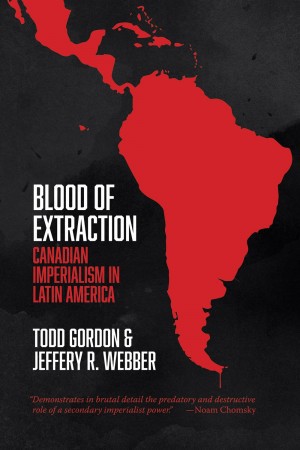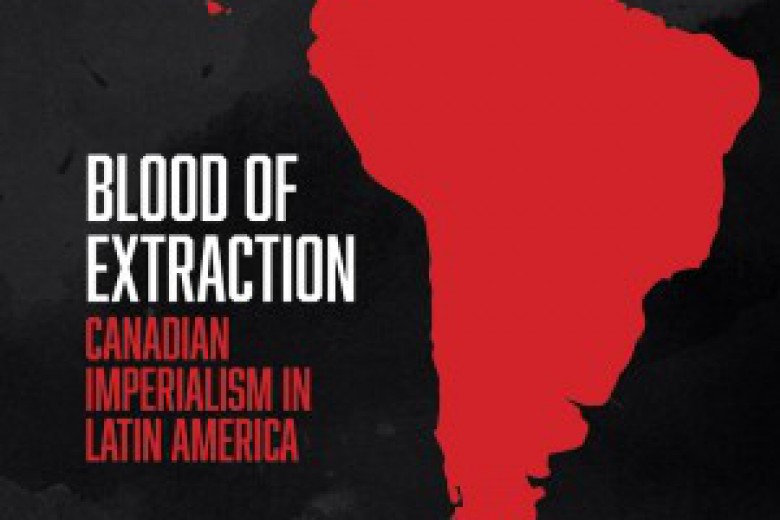
Blood of Extraction: Canadian Imperialism in Latin America
Fernwood Publishing, 2016
With contributions from Jerome Klassen, Simon Granovsky-Larsen, Kyla Sankey, and Nicole Fabricant.
Profits, Coercion, and Resistance – An Introduction to the symposium on Blood of Extraction: Canadian Imperialism in Latin America
An article published in Third World Quarterly in 2008 was our initiation into collaborative work on Canadian mining imperialism and the popular forms of resistance it systematically engenders in Latin America. It was the first seed. After a lengthy stretch of germination, this led almost a decade later to our new book, Blood of Extraction: Canadian Imperialism in Latin America. In the preliminary stages, when Blood of Extraction wasn’t even a full-fledged idea, Todd was working on the manuscript that would become Imperialist Canada (2010), and Jeff was trying to map out the cycle of left-Indigenous revolt in early 21st century Bolivia and the rise to the presidency of Evo Morales. This eventually took shape in Red October: Left-Indigenous Struggles in Modern Bolivia (2011), and From Rebellion to Reform in Bolivia: Class Struggle, Indigenous Liberation, and the Politics of Evo Morales (2011).
Focused collaboration on Blood of Extraction began in earnest in 2010, and in many ways the argument flows logically out of those earlier books. Imperialist Canada sought to explain Canada’s settler-colonial and capitalist foundations in the racist dispossession of Indigenous peoples, and its eventual rise as a secondary imperialist power within the global capitalist hierarchy. Through the prism of Bolivian history, Red October and From Rebellion to Reform, meanwhile, tackled questions of Latin America’s subordinate incorporation into the world market, the historical formation of capitalist states in the region, and the often radical struggles of subaltern classes and oppressed groups within, against, and beyond domestic capitalist states and the machinations of various imperialisms.
Our fundamental analytical and empirical concern in Blood of Extraction is the role assumed by the Canadian state within the worldwide system of capitalist imperialism in relation to Latin America. Capitalist imperialism is characterized by deep structural inequalities between regions and countries. These inequalities are exacerbated by the uneven development of global capitalist relations, and are reproduced through the active policies adopted by imperialist states and powerful international financial institutions, such as the International Monetary Fund and the World Bank. Capitalist imperialism involves the draining of the wealth and resources of poorer countries to benefit Global North capital, at the cost of the majority of the peoples of the Global South.
We started our research with a number of questions. What are the specific ways in which this systemic dynamic has played itself out in Canadian-Latin American relations? What forms have Canadian capitalist expansion and Canadian state interference in Latin America assumed in recent decades? How have Latin American workers, peasants, and Indigenous communities – dispossessed and exploited by Canadian capital – responded in turn? What precisely are the contours of this dialectic of accumulation by dispossession and the popular resistance to it?
We began with Statistics Canada databases of Canadian foreign direct investment and the industry journals of the mining sector. We surveyed the secondary literature in Spanish and English, and pored over the archives of newspapers and magazines throughout the Americas. This was the work of the sleuth and the economist, detecting hidden truths beneath official lies, drawing connections, and constructing models of Canadian interests and investments throughout the region.
Patterns emerged. In 1990, Canadian foreign direct investment into Latin America and the Caribbean stood at only C$2.58 billion in stock (that is, cumulative FDI flows). It rose to C$25.3 billion in 2000, an increase of 880 per cent, and to C$59.4 billion – amid the deepest global economic recession since the 1930s – in 2013, an increase of 134 per cent from the year 2000, and 2,198 per cent from the year 1990. The figures for 2000 and 2013, moreover, are certainly an underrepresentation of the extent of Canadian capital’s penetration of the region, as Statistics Canada’s data, from which these figures are primarily drawn, does not include Canadian investment that is routed through the Caribbean Offshore Financial Centers (OFC); if it did, would likely double to triple the figures for some countries, given how strong Canadian financial capital’s presence is in the Caribbean OFC, as we note below. Canadian investment is occurring across a range of sectors. Canadian textile manufacturers, and oil and gas, pipeline, and construction companies play prominent and controversial roles in the hemisphere. But it is clearly in the financial and mining sectors where Canadian companies are most prominent. The motivation underlying all of this investment is profit, regardless of the cost to human rights and the environment. The purpose of Canadian foreign policy in Latin America is in turn to enable and enhance the profit-making potential of Canadian multinational firms, above all in finance and mining.
Next we turned to access-to-information requests. Sifting through the thousands of pages of documents generated through such requests over a number of years revealed precisely how the different apparatuses of the Canadian state – the Prime Minister’s Office (PMO), Foreign Affairs, the Canadian International Development Agency (CIDA) (as of 2015, Foreign Affairs, CIDA, and International Trade are now part of Global Affairs Canada), National Defence, Natural Resources Canada, Health Canada, and Canadian embassies throughout the region – sought systematically to intervene in domestic Latin American affairs on behalf of Canadian capital. Most of the relevant activities we uncovered passed without mention in the mainstream Canadian media.
In recent years, the Canadian state has lent its support to a repressive post-coup regime in Honduras; it has provided military and ideological backing for a repressive government in Colombia, one that boasts the hemisphere’s worst record on human rights; it has aggressively interfered in the domestic affairs of left-of-centre Latin American governments, such as that of Hugo Chávez in Venezuela and Rafael Correa in Ecuador; it has supported ecological destruction and the dislocation of vulnerable populations in the region through its support for Canadian natural resource companies; it has provided cover for exploitative working conditions in the factories of Canadian companies operating in the export processing zones of Central America; it has sought to delegitimize, co-opt, or coerce popular movements that have directly challenged the economic interests of Canadian capital. This is the reality with which any honest study of Canada’s growing political and economic engagement with Latin America must start. Furthermore, these are not extreme or isolated examples, we discovered; these trends are at the core of Canadian foreign policy in Latin America, animating the dialectic of Canadian capitalist expansion and popular resistance in the region.
Finally, we turned to interviews with trade unionists, Indigenous activists, peasant militants, human rights lawyers, feminists, and environmentalists. During repeated trips to Honduras, Guatemala, Venezuela, Ecuador, and Bolivia, we spoke to people on the front lines of the many ongoing battles against Canadian capitalists and diplomats throughout Latin America, from Mexico to Argentina. Our interview material demonstrates decisively that the Indigenous and peasant communities dispossessed by Canadian mining companies, and the women workers in the sock and T-shirt factories exploited by Canadian capital, are not meek and passive victims of imperial abuse. They are fighting back in myriad creative ways, with often astonishing courage and commitment. This book aims to contribute in a small way to their multifaceted efforts to dismantle the architectures of coercion and exploitation.
Blood of Extraction begins with an introductory chapter theorizing Canada’s position in the imperialist world order today, and shows specifically the drivers and dynamics of Canadian imperialism in Latin America. In the rest of the book, we trace the increasingly aggressive insertion of the Canadian state and capital into the complex political economy of Latin America, with a particular focus on two subregions: Central America and the Andes. Canadian capital, especially in banking and natural resource development, plays a leading role in capitalist accumulation throughout the Americas, while the Canadian state is assertively pursuing the conditions amenable to Canadian investors: liberalized markets, weak environmental regulatory regimes, and contained or repressed social movements. The first section of the book looks at the dynamics of capitalist expansion and resistance as they have played out in Central America. Canada has positioned itself as an important player in the isthmus, supporting reactionary forces, including the pro-coup actors in Honduras. The section is anchored by the chapter on Honduras, which pivots on the 2009 coup against democratically elected president Manuel Zelaya, but also includes a detailed account of Canada’s political-economic intervention in Guatemala and the rest of the region. The second section of the book looks at the Andes. Canadian capital has major interests in Ecuador, Peru, and Colombia, while leftist resurgence in Latin America has been strongest in the central and northern Andes. Thus, there is a great deal at stake for Canadian investors in a region where their interests are regularly challenged by strong social movements and, occasionally, governments. As our chapters covering Ecuador, Colombia, Peru, and Venezuela argue, the Canadian state has worked assiduously to weaken Andean social movements and the Ecuadorian and Venezuelan governments, while simultaneously seeking to strengthen diplomatic and military ties with conservative governments in Colombia and Peru.
Next
Page 2. Jerome Klassen, Canada and the changing structures of global power
Ahead
Page 3: Simon Granovsky-Larsen Backroom dealings and kick-back schemes
Page 4: Kyla Sankey, Accumulation by dispossession, expanded reproduction, and class transformations in Latin America
Page 5: Nicole Fabricant, Linking our consumptive lives to the trails of destruction
Page 6: Todd Gordon and Jeffery Webber, Response



